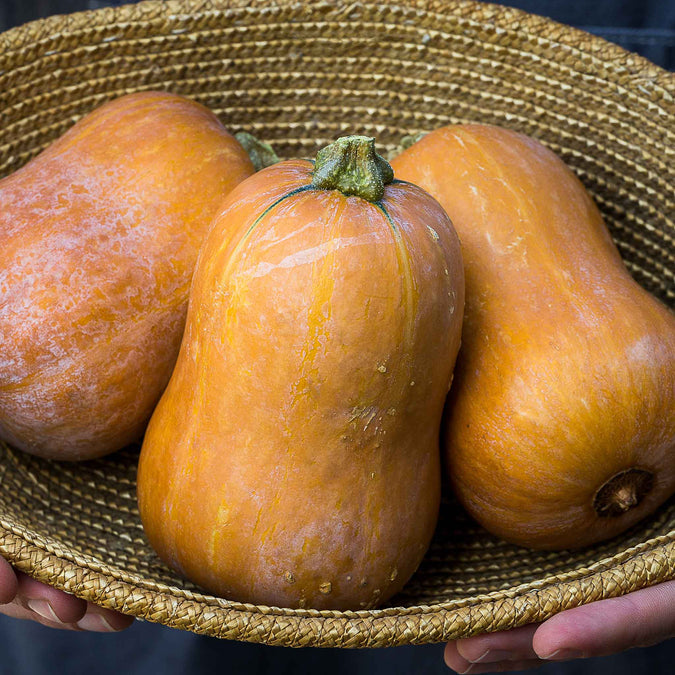
Dharaseeds
Squash (Winter) Seeds - Honeynut
Estimated delivery between April 15 and April 18.
Honeynut Squash is a small, sweet, and versatile winter squash variety that has become a popular choice among gardeners and chefs. With its deep orange flesh and rich, honey-sweet flavor, Honeynut squash offers a delightful alternative to other winter squash varieties. It is known for its small size, making it perfect for individual servings and a variety of recipes. Honeynut squash is easy to grow, has a long shelf life, and is a great addition to both savory and sweet dishes.
Key Benefits
- Sweet, Honey-Like Flavor: Honeynut squash is renowned for its sweet, nutty taste, which is even sweeter than butternut squash.
- Small Size: This variety is compact, making it ideal for smaller gardens and kitchens. Each squash typically weighs around 1 pound, perfect for individual servings.
- Rich in Nutrients: Honeynut squash is a good source of vitamins A and C, fiber, and antioxidants, making it a nutritious addition to your meals.
- High Yield: Despite its smaller size, Honeynut squash produces a high yield of tender, flavorful squashes.
- Long Shelf Life: Like most winter squash, Honeynut squash stores well for months, allowing you to enjoy it long after the harvest.
Variety Features
- Appearance: Honeynut squash has a deep orange, smooth skin with a bulbous bottom and a narrow neck. The flesh is a vibrant orange, with a fine texture.
- Flavor: Known for its exceptionally sweet, honey-like flavor and creamy, smooth texture when cooked.
- Maturity: This variety matures in about 90-100 days, offering an early harvest for those in regions with shorter growing seasons.
- Size: Each Honeynut squash typically weighs 1-1.5 pounds, making it the perfect size for single servings or small dishes.
Planting Instructions
Best Planting Season
- Warm Weather: Plant Honeynut squash after the last frost when the soil temperature reaches at least 60°F (16°C). This variety thrives in full sun and warm temperatures.
Planting Details
- Sowing Depth: Sow seeds about 1-2 inches deep in well-draining, fertile soil.
- Spacing: Space plants 36-48 inches apart, as Honeynut squash plants require room to spread.
- Soil: Prefers well-drained, loamy soil with a pH level between 6.0 and 7.5. Amend soil with compost to improve fertility and drainage.
Care Instructions
Watering
- Water consistently throughout the growing season, keeping the soil evenly moist but not waterlogged. Use drip irrigation to water at the base of the plants and avoid wetting the foliage to reduce disease risk.
Light
- Honeynut squash requires full sun for at least 6-8 hours per day. Ensure that plants receive plenty of sunlight to promote healthy growth and development.
Temperature
- Ideal temperatures for growing Honeynut squash are between 70°F and 85°F (21°C-29°C). It is a warm-season crop, so protect it from frost and cold temperatures.
Harvesting
When to Harvest
- Harvest Honeynut squash when the skin has turned a deep orange and is hard to the touch. The squash should feel firm, and the stem should dry out and become woody.
- The typical harvesting window for Honeynut squash is about 90-100 days after planting.
How to Harvest
- Use a sharp knife or garden shears to cut the squash from the vine, leaving a 2-3 inch stem attached. Be careful not to damage the squash during the harvesting process.
Storage
- Short-Term: For short-term storage, store squash in a cool, dry, and dark place with good air circulation. It can last for 1-2 weeks at room temperature.
- Long-Term: Honeynut squash can be stored for several months in a cool (50-60°F / 10-15°C), dry, and well-ventilated space. Under these conditions, it can keep for up to 3-4 months.
Culinary Uses
- Roasted: Slice the squash in half, remove the seeds, and roast with olive oil, salt, and pepper to caramelize the sugars and bring out the sweet flavor.
- Soups and Stews: Puree roasted Honeynut squash to make creamy soups or add it to stews for a rich, velvety texture.
- Pies and Baked Goods: Use the mashed squash in baking recipes like pies, muffins, or bread for a deliciously sweet, moist texture.
- Salads: Roasted Honeynut squash makes a great addition to salads, adding both sweetness and texture.
- Casseroles and Gratin: Combine with cheese, herbs, and breadcrumbs for a hearty and comforting side dish.
Conclusion
Honeynut Squash is a wonderful choice for gardeners seeking a small, sweet, and easy-to-grow winter squash. Its honey-like flavor, creamy texture, and versatility in the kitchen make it a perfect addition to many recipes. Whether roasting, pureeing, or baking, Honeynut squash will elevate your dishes. With its compact size, high yield, and long shelf life, it’s an excellent choice for small gardens and kitchens, offering delicious meals well into the winter months.









